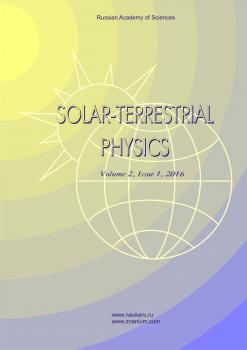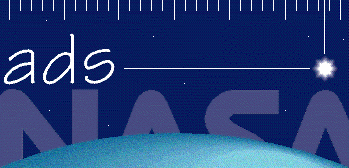Якутск, Россия
Using annual average values, the relationships are examined of the geomagnetic indices SYM-H, ASY-H, and Dst with solar wind parameters in 1981–2015. The data used was divided into two samples according to the sign of the north-south component Bn of the interplanetary magnetic field (IMF). Variations in the annual average values of each of the Dst, SYM-H, and ASY-H indices for southward and northward IMF have been found to be similar and their linear correlation coefficients r to be high: 0.871, 0.863, and 0.943 respectively. The similarity between variations of the indices with different signs of Bn is probably due to their connection with the number of sunspots. It has been established that Dst, SYM-H, and ASY-H depend on the solar wind parameter β: their absolute values decrease with increasing β, regardless of Bn sign. The decrease in the indices with increasing β is likely to be caused by the transition of the magnetosphere to a quiet state due to the increasing predominance of thermal pressure over magnetic one in the solar wind and a decrease in the level of solar wind turbulence. SYM-H and ASY-H have been found to reveal the closest relationships with β, whereas SYM-H more strongly depends on β for southward IMF (r=0.744) than for northward IMF (r=0.677). On the contrary, for ASY-H r=–0.741 at northward IMF and r=–0.719 at southward IMF. Similar to SYM-H, Dst (to a lesser extent) significantly correlates with β at southward IMF (r=0.629) and weaker at northward IMF (r=0.456).
geomagnetic indices Dst, SYM-H, and ASY-H, geomagnetic activity, magnetospheric ring current, interplanetary parameters
1. Alexeev I.I., Belenkaya E.S., Kalegaev V.V., Feldstein Y.I., Grafe A. Magnetic storms and magnetotail currents. J. Geophys. Res. 1996, vol. 101, no. A4. P. 7737–7747. DOI:https://doi.org/10.1029/95JA03509.
2. Bazarzhapov A.D., Matveev M.I., Mishin V.M. Geomagnitnye variatsii i buri [Geomagnetic Variations and Storms]. Novosibirsk, Nauka Publ., 1979, 248 p. (In Russian).
3. Bhaskar A., Vichare G. Forecasting of SYMH and ASYH indices for geomagnetic storms of solar cycle 24 including St. Patrick’s day, 2015 storm using NARX neural network. J. Space Weather Space Climate. 2019, vol. 9, A12. DOI: 10.1051/ swsc/2019007.
4. Dubyagin S., Ganushkina N., Kubyshkina M., Liemohn M. Contribution from different current systems to SYM and ASY midlatitude indices. J. Geophys. Res.: Space Phys. 2014, vol. 119, pp. 7243–7263. DOI:https://doi.org/10.1002/2014JA020122.
5. Echer E., Gonzalez W.D., Tsurutani B.T. Statistical studies of geomagnetic storms with peak Dst≤–50 nT from 1957 to 2008. J. Atmos. Solar-Terr. Phys. 2011, vol. 73, pp. 1454–1459. DOI:https://doi.org/10.1016/j.jastp.2011.04.021.
6. Greenspan M.E., Hamilton D.C. A test of the Dessler-Parker-Sckopke relation during magnetic storms. J. Geophys. Res. 2000, vol. 105, no. A3, pp. 5419–5430.
7. Haiducek J.D., Welling D.T., Ganushkina N.Y., Morley S.K., Dogacan Su Ozturk. SWMF Global Magnetosphere Simulations of January 2005: Geomagnetic Indices and Cross-Polar Cap Potential. Space Weather. 2017, vol. 15, pp. 1567–1587.
8. Iyemori T., Araki T., Kamei T., Takeda M. Mid-latitude geomagnetic indices ASY and SYM (provisional). Data Anal. Cent. For Geomagn. and Space Magn., 1992. Faculty of Sci., Kyoto Univ., Kyoto, Japan.
9. Kalegaev V.V., Ganushkina N.Y., Pulkkinen T.I., Kubyshkina M.V., Singer H.J., Russell C.T. Relation between the ring current and the tail current during magnetic storms. Ann. Geophys. 2005, vol. 23, pp. 523–533. DOI:https://doi.org/10.5194/angeo-23-523-2005.
10. Kovalenko V.A. Solnechny veter [Solar wind]. Moscow, Nauka Publ, 1983. 272 p. (In Russian).
11. Kurazhkovskaya N.A. Global disturbance of Earth’s magnetosphere and its connection with space weather. Solar-Terr. Phys. 2020, vol. 6, iss. 1, pp. 41–49. DOI:https://doi.org/10.12737/stp-61202005.
12. Kurazhkovskaya N.A., Kurazhkovskii A.Yu. Hysteresis effect between geomagnetic activity indices (Ap, Dst) and interplanetary medium parameters in solar activity cycles 21–24. Solar-Terr. Phys. 2023, vol. 9, iss. 3, pp. 68–76. DOI:https://doi.org/10.12737/stp-93202308.
13. Kurazhkovskaya N.A., Zotov O.D., Klain B.I. Relationship between geomagnetic storm development and the solar wind parameter β. Solar-Terr. Phys. 2021, vol. 7, iss. 4, pp. 24–32. DOI:https://doi.org/10.12737/stp-74202104.
14. Liemohn M.W., McCollough J.P., Jordanova V.K., Ngwira C.M., Morley S.K., Cid C., et al. Model evaluation guidelines for geomagnetic index predictions. Space Weather. 2018, vol. 16, pp. 2079–2102. DOI: 10.1029/ 2018SW002067.
15. Lockwood M., McWilliams K.A. On optimum solar wind magnetosphere coupling functions for transpolar voltage and planetary geomagnetic activity. J. Geophys. Res. 2021, vol. 126, e2021JA029946. DOI:https://doi.org/10.1029/2021JA029946.
16. Makarov G.A. Offsets in the geomagnetic indices of the magnetospheric ring current. Solar-Terr. Phys. 2021, vol. 7, iss. 3, pp. 29–35. DOI:https://doi.org/10.12737/stp-73202103.
17. Makarov G.A. Geomagnetic indices ASY-H and SYM-H and their relation to interplanetary parameters. Solar-Terr. Phys. 2022, vol. 8, iss. 4, pp. 36–43. DOI:https://doi.org/10.12737/stp-84202203.
18. Maltsev Y.P., Arykov A.A., Belova E.G., Gvozdevsky B.B., Safargaleev V.V. Magnetic flux redistribution in the storm time magnetosphere. J. Geophys. Res. 1996, vol. 101, no. A4, pp. 7697–7704.
19. Newell P.T., Sotirelis T., Liou K., Meng C.-I., Rich F.J. A nearly universal solar wind-magnetosphere coupling function inferred from 10 magnetospheric state variables. J. Geophys. Res. 2007, vol. 112, A01206. DOI:https://doi.org/10.1029/2006JA012015.
20. Obridko V.N., Kanonidi Kh.D., Mitrofanova T.A., Shelting B.D. Solar Activity and Geomagnetic Disturbances. Geomagnetism and Aeronomy. 2013, vol. 53, no. 2, pp. 147–156. DOI:https://doi.org/10.1134/S0016793213010143.
21. Richardson I.G., Cliver E.W., Cane H.V. Sources of geomagnetic activity over the solar cycle: Relative importance of coronal mass ejections, high-speed streams, and slow solar wind. J. Geophys. Res. 2000, vol. 105, no. A8, pp. 18,203–18,213. DOI:https://doi.org/10.1029/1999JA000400.
22. Shi Y., Zesta E., Lyons L.R., Yumoto K., Kitamura K. Statistical study of effect of solar wind dynamic pressure enhancements on dawn-to-dusk ring current asymmetry. J. Geophys. Res. 2006, vol. 111, A10216. DOI:https://doi.org/10.1029/2005JA011532.
23. Singh A.K., Sinha A.K., Pathan B.M., Rajaram R., Rawat R. Effect of prompt penetration on the low latitude ASY indices. J. Atmos. Solar-Terr. Phys. 2013, vol. 94, pp. 34–40. DOI: 10.1016/ j.jastp.2012.12.015.
24. Sugiura M., Kamei T. Equatorial Dst index 1957–1986. IAGA Bull. 1991, no 40, 14 p.
25. Tsyganenko N.A., Sitnov M.I. Modeling the dynamics of the inner magnetosphere during strong geomagnetic storms. J. Geophys. Res. 2005, vol. 110, A03208. DOI:https://doi.org/10.1029/2004 JA010798.
26. Weygand J.M., McPherron R.L. Dependence of ring current asymmetry on storm phase. J. Geophys. Res. 2006, vol. 111, A11221. DOI:https://doi.org/10.1029/2006JA011808.
27. Yermolaev Yu.I., Nikolaeva N.S., Lodkina I.G., Yermolaev M.Yu. Catalog of Large-Scale Solar Wind Phenomena during 1976–2000. Cosmic Res. 2009, vol. 47, no. 2, pp. 81–94. DOI:https://doi.org/10.1134/S0010952509020014.
28. Yermolaev Y.I., Lodkina I.G., Nikolaeva N.S., Yermolaev M.Y. Occurrence rate of extreme magnetic storms. J. Geophys. Res.: Space Phys. 2013, vol. 118, pp. 4760–4765. DOI:https://doi.org/10.1002/jgra.50467.
29. Yermolaev Y.I., Lodkina I.G., Nikolaeva N.S., Yermolaev M.Y., Riazantseva M.O., Rakhmanova L.S. Statistic study of the geoeffectiveness of compression regions CIRs and Sheaths. J. Atmos. Solar-Terr. Phys. 2018, vol. 180, pp. 52–59. DOI:https://doi.org/10.1016/j.jastp.2018.01.027.
30. URL: http://wdc.kugi.kyoto-u.ac.jp/aeasy/asy.pdf (accessed October 5, 2021).
31. URL: https://wdc.kugi.kyoto-u.ac.jp/index.html (accessed March 29, 2023).
32. URLhttp://omniweb.gsfc.nasa.gov/ (accessed March 29, 2023).

















